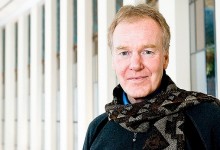In this poignant, funny follow-up to his 2006 talk, Sir Ken Robinson makes the case for a radical shift from standardized schools to personalized learning. Robinson, who recently published ‘The Element: How Finding Your Passion Changes Everything‘ became popular after his 2006 TED talk titled “Do Schools Kill Creativity?”
In this talk he claims we are not only a facing a climate crisis of natural resources but also a crisis of HUMAN resources. The world can be divided into people who endure what they do versus those who are enjoying what they do. Unfotunately the second group is a minority because education has dislocated these people from their natural talents. Most talents are like real natural reseources: they are burried deep. And education as we know it is designed to flatten out the individuality of our talent.
However, we are blocked by the tyrany of common sense as paraphased by Abraham Lincoln: The dogmas of the quiet past are inadequate to the stormy present. The occasion is piled high with difficulty, and we must rise WITH the occasion. As our case is new, so we must think anew and act anew.
Many of our ideas have been formed not to meet the circumstances of this century but to cope with the circumstances of previous centuries. However, our minds are still hypnotised by them. It’s very hard to know what you take for granted… just because you take it for granted.
Robinson goes on to talk about CONFORMITY: We have built our education systems on the models of fast food: everything is standardized instead of customized to local circumstances. In turn, this is impoverishing our spirits and our energies in the same way that fast food is downgrading our physical bodies.
He concludes that it’s about passion; doing stuff that feeds your spirit. The kind of thing you are doing when time seems to fly. Like Seth Godin in his book Linchpin: Are You Indispensable?, Ken Robinson links the search for passion to the end of the industrial revolution. We need to get out of our industrial model of education, which is based on linearity and conformity to an organic model.
The one thing we need to understand is that learning and education are organic instead of manufacture-like This last idea reminds me of Peter Senge’s famous quote:
“We keep bringing in mechanics–when what we need are gardeners. We keep trying to drive change–when what we need to do is cultivate change.”



